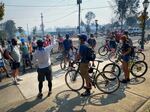It didn’t matter that the skies were filling with smoke for this group of cyclists in Ashland, because they had a mission: to bring food and water to people in Talent and Phoenix who were running low.
Local officials aren’t allowing any cars into those nearby towns, even residents, because of gas leaks and downed power lines. The Almeda Fire first started in Ashland on Tuesday, but strong winds pushed it north where it destroyed hundreds of homes in nearby communities. Many people are still living there and they don’t have electricity or potable water.
That’s where the Ashland Bike Brigade came in. Nearly a hundred cyclists spread across town carrying cases of water, sandwiches, pet food, and other supplies. They got there through a nearby bike path.
Cyclist John Baxter — who is also a producer at Jefferson Public Radio — stopped at a home in Talent where a man was standing in the front yard.
“You guys good?” Baxter asked Bill Corlett. “Do you need water or anything?”
Corlett said there are four people and pets living in his home. Although the city recently turned the water back on, it was not potable.
“They’re not letting anybody in,” Corlett said. “You can get out, but you can’t get in.”

Cyclists with the Ashland Bike Brigade delegate tasks in Talent, a town that was devastated by the Almeda Fire.
April Ehrlich / JPR
Just a couple days earlier, flames had engulfed entire blocks in Talent. Even so, some people chose not to evacuate. They didn’t think the fire would reach them, or they wanted to protect their home from the flames. Or, they just didn’t have a way to evacuate because they didn’t have a car.
Whatever reason they had, it wasn’t important. These cyclists were there to help. Among them was Nick David, who grew up in Talent but now lives in Ashland. He rode a large cargo bike carrying gallons of water, including a 5-gallon bottle strapped into a child’s seat. But that morning, he was having trouble giving it away.
“I’ve heard several people say there are more people in need than me,” Bandoroff said, riding his bike through the empty streets. “But where are they?”
It seemed like a lot of people didn’t think they deserved it, he said. That there were others out there who needed it more. There were also just more cars sneaking in with supplies through back roads.
Even so, almost everyone appreciated this small bit of kindness. David stopped at a home in Talent where a woman opened the door. Susan Silva said her daughter recently brought in water from a back road, so she was set. But she thanked David and begins to cry.
“I really appreciate that you’re out there, with the smoke and COVID and just all of it,” Silva said. “I just feel beaten down. I broke my ankle 10 weeks ago. This has just sucked, this summer has just sucked. And so this really made my heart happy.”
Back in the center of town, cyclist Scott Bandoroff sat among a group that delegated tasks to others who had brought supplies. He did bring some water, but mostly, he came because he’s a psychologist with experience in crisis counseling. He was there to provide support to people who need it.
“It’s often several months later that it really hits people,” Bandoroff said. “Many people do what they need to do to meet immediate survival needs, because that’s what’s important — taking care of your children and things like that — but after that’s done and it settles in, it’s a few months out.”
He also met people who declined water because they thought someone else needed it more.
“I saw a guy, he said, ‘I hate to say this, but we’re kind of used to this,’” Bandoroff recalled. “But, you’re used to smoke, not having your community members wiped out like this.”
Bandoroff said it’s natural for people tend to discredit their feelings. There’s always someone who has it worse off.
“The feeling that, ‘Oh, I should be OK. I didn’t even lose my home.’ You don’t compare traumas,” Bandoroff said. “What you’re feeling is absolutely legitimate and valid, and you need to honor that and get the support you need, even if you think you shouldn’t need it.”
Bandoroff and other mental health professionals will be among a list of that Jackson County Public Health is compiling for people who need crisis support. Because even after these fires finally subside and the smoke clears, the physical and emotional damage left behind will likely last for years.
